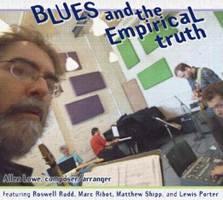Home » Jazz Articles » Album Review » Allen Lowe: Blues and the Empirical Truth
Allen Lowe: Blues and the Empirical Truth
Recorded in Brooklyn and Portland, Lowe arranged an assortment of instrumental configurations to extrapolate venerable blues tropes—abstracting and reconfiguring the standard form according to his capricious whims. The sheer volume and variety of material is staggering (52 cuts over three and half hours), sprawling from lyrically austere chamber-like vignettes to rousing punkish tirades. Having recently switched from tenor to alto (in addition to playing C melody saxophone and a bit of primitive but effective guitar), Lowe's soulful tone and probing phrasing serves as the date's unifying factor, instilling a sense of rough-hewn consistency to the eclectic proceedings.
Though the collection is filled with an endless array of stylistic detours—far too many to list—the stalwart contributions of Lowe's sidemen cannot be understated. Ribot's spiky fretwork, Rudd's blustery vocalisms and Shipp's elliptical contributions (on piano and Farfisa organ) imbue the set with expressionistic ardor, while the efforts of Lowe's Maine-based cohorts find concordance in their amiable rapport. Key among them is guitarist Ray Suhy, whose scorching leads veer from Delta-inspired anguish to metallic posturing. Unfortunately, Jake Millet's electronic percussion sounds at odds with the session's stripped-down aesthetic; his digital drums' lacking spatial presence and artificial decay is suitably futuristic, but ultimately proves more distracting than engaging.
Ironically, Wynton Marsalis is one of the key instigators of this vanguard project; an argument with Marsalis over the role of minstrelsy in African-American musical history indirectly led to Lowe's publication of Really the Blues? A Blues History, 1893-1959 (encompassing a 36 CD set and an 80,000 word essay!), which subsequently resulted in this unique exploration of the malleable idiom—in all its many guises. Endlessly revealing, Blues and the Empirical Truth is a fascinating journey into one man's vision of modern music's most basic and resilient foundations.
Track Listing
CD1: Blue Like Me, Pt. 1; Twilight at Terezin; No 5 No Flats No Sharps Blues; (Bull Connor Sees) Darkies on the Delta; Huh/Sublime and Funky Love, Pt. 1; No More Blues (the Sins of the Mother); Manhattan Moan; Carnovsky's Blues/The Whores' Dance; The Children of Ella Mae Wiggins; Blue Interlude 1; Ras Speaks 1; Pete Brown's Blues; Sweet Joe Pye Weed; Mama, Mercy Comes in Spurts, Pt. 1; In a Harlem Ashram; Five out of Four Blues; Blues in Shreds; CD2: Blues and Transfiguration; I Hate Blues; My Clinch Mountain Blues; The Trapeze Artist's Anxiety and the First Note the Jazz Band Blows--or: Jim Crow Eyes in No Man's Land; I Will Sing Me a Parable Under Water; Temperance March; Entrance No Exit; Electro Convulsive Blues; In Da Sunset of Your Love; Speckled Shaw Crippled Pete Boogie; Mama, Mercy Comes in Spurts, Pt. 2; The Lost; Seasons of the Witch Doctor; Pauli Murray, at the Back of the Bus, Suddenly Realizes She Has the Blues; I Hate Blues, Too; Blue Like Me, Pt. 2; Blue Interlude 2; My Confession: Ode to Doris Day (The Last Embrace); CD 3: Near a Baptist Meeting; Old Man Blues; Elvis Died with His Sins Intact; No 5 No Flats No Sharps Blues, Pt. 2; The Moon is Setting on the Whore Eye Zone; One Trane Running; Ras Speaks, Pt. 2; Williamsburg Blues; Cold Bed Blues; Blue Collage: Don't Put Off Salvation; Schildkraut on 52 Street; In the Realm of the Blue; Reconstruction Dreams (the Ballad of Blind Tom); Blood On the Mirror; I Am A Delta Terrorist; Ras Speaks, Pt. 3; I Hate Blues Again.
Personnel
Allen Lowe
saxophoneAllen Lowe: composer/arranger, alto saxophone, C melody saxophone, guitar, tenor saxophone; Marc Ribot: guitar; Ray Suhy: guitar; Spike Sikes: alto saxophone; Jessie Hautala: bass; Chris Day: bass; Derek Reynolds: bass; Jake Millet: electronic drums; Matthew Shipp: piano, Farfisa organ; Lewis Porter: piano; Roswell Rudd: trombone; Todd Hutchinson: vocals.
Album information
Title: Blues And The Empirical Truth | Year Released: 2011 | Record Label: Music & Arts
< Previous
Bill Bruford: The Autobiography (Sign...
Next >
Nausicaa
Comments
Tags
For the Love of Jazz
 All About Jazz has been a pillar of jazz since 1995, championing it as an art form and, more importantly, supporting the musicians who create it. Our enduring commitment has made "AAJ" one of the most culturally important websites of its kind, read by hundreds of thousands of fans, musicians and industry figures every month.
All About Jazz has been a pillar of jazz since 1995, championing it as an art form and, more importantly, supporting the musicians who create it. Our enduring commitment has made "AAJ" one of the most culturally important websites of its kind, read by hundreds of thousands of fans, musicians and industry figures every month.



















